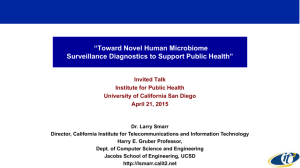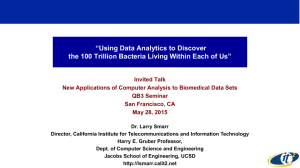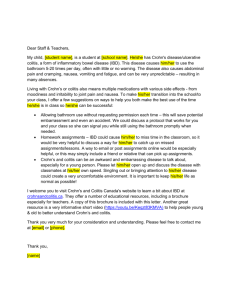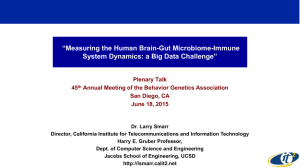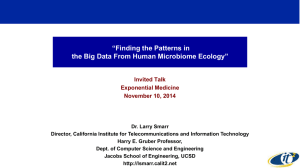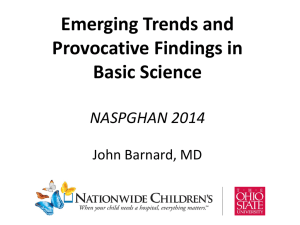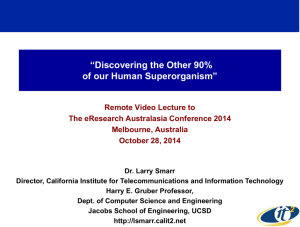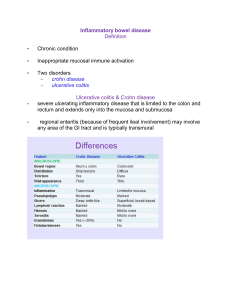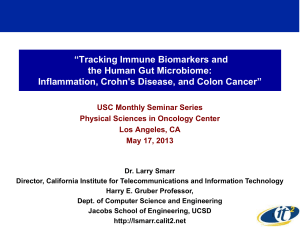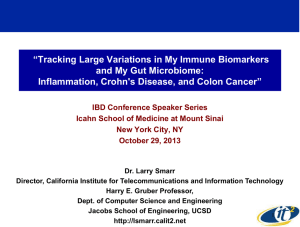PPT - Larry Smarr - California Institute for Telecommunications and
advertisement
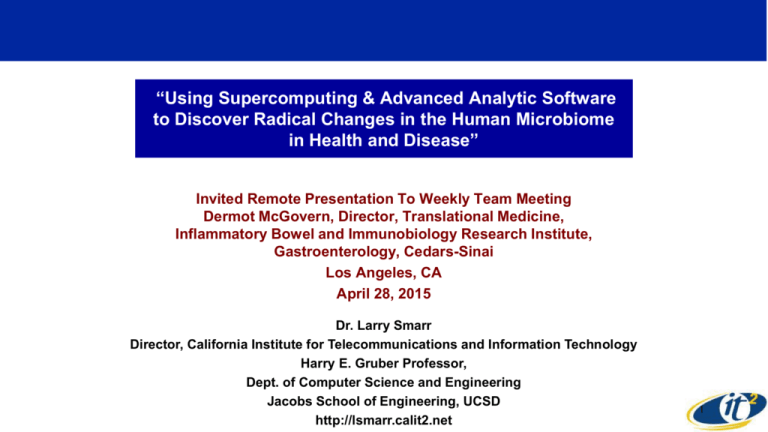
“Using Supercomputing & Advanced Analytic Software to Discover Radical Changes in the Human Microbiome in Health and Disease” Invited Remote Presentation To Weekly Team Meeting Dermot McGovern, Director, Translational Medicine, Inflammatory Bowel and Immunobiology Research Institute, Gastroenterology, Cedars-Sinai Los Angeles, CA April 28, 2015 Dr. Larry Smarr Director, California Institute for Telecommunications and Information Technology Harry E. Gruber Professor, Dept. of Computer Science and Engineering Jacobs School of Engineering, UCSD http://lsmarr.calit2.net 1 I Discovered I Had IBD By Analyzing 150 Blood and Stool Variables, Each Over 5-10 Years Calit2 64 megapixel VROOM One Blood Draw For Me Only One of My Blood Measurements Was Far Out of Range--Indicating Chronic Inflammation 27x Upper Limit Episodic Peaks in Inflammation Followed by Spontaneous Drops Normal Range <1 mg/L Normal Complex Reactive Protein (CRP) is a Blood Biomarker for Detecting Presence of Inflammation Adding Stool Tests Revealed A Likelihood of My Having IBD Typical Lactoferrin Value for Active IBD 124x Upper Limit Hypothesis: Lactoferrin Oscillations Coupled to Relative Abundance of Microbes that Require Iron Normal Range <7.3 µg/mL Lactoferrin is a Glycoprotein Shed from Neutrophils An Antibacterial that Sequesters Iron Dynamical Innate and Adaptive Immune Oscillations From Stool Samples Adaptive Immune System Normal 50 to 200 Innate Immune System Normal <600 Correlating Immune/Inflammation Time Series With Symptom/Sign, Pharmaceuticals, and Stool Metagenomics Time Series I Found I Had One of the Earliest Known SNPs Associated with Crohn’s Disease From www.23andme.com ATG16L1 IRGM NOD2 Polymorphism in Interleukin-23 Receptor Gene — 80% Higher Risk of Pro-inflammatory Immune Response rs1004819 SNPs Associated with CD There Is Likely a Correlation Between CD SNPs and Where and When the Disease Manifests NOD2 (1) Rs2066844 2.08x Increased Risk Subject with Ileal Crohn’s Female CD Onset At 20-Years Old Il-23R Rs1004819 1.8x Increased Risk Subject with Colonic Crohn’s Me-Male CD Onset At 60-Years Old Source: Larry Smarr and 23andme A Statistical Study is Needed to Determine If NOD2 and IL23R Are Associated with Different Disease Phenotypes “Associations Between NOD2/CARD15 Genotype and Phenotype in Crohn’s Disease-Are We there Yet?,” Radford-Smith and Pandeya, World J. of Gastroentrology, 28, 7097-7103 (2006) I Also Had an Increased Risk for Ulcerative Colitis, But a SNP that is Also Associated with Colonic CD I Have a 33% Increased Risk for Ulcerative Colitis HLA-DRA (rs2395185) I Have the Same Level of HLA-DRA Increased Risk as Another Male Who Has Had Ulcerative Colitis for 20 Years “Our results suggest that at least for the SNPs investigated [including HLA-DRA], colonic CD and UC have common genetic basis.” -Waterman, et al., IBD 17, 1936-42 (2011) So IBD May be Stratified by a Personalized Combination of the 163 Known SNPs Associated with IBD The Current Division of IBD Into Crohn’s Disease and Ulcerative Colitis May Turn Out to be Superseded by a More Accurate Human Genetic Stratification • The width of the bar is proportional to the variance explained by that locus • Bars are connected together if they are identified as being associated with both phenotypes • Loci are labelled if they explain more than 1% of the total variance explained by all loci “Host–microbe interactions have shaped the genetic architecture of inflammatory bowel disease,” Jostins, et al. Nature 491, 119-124 (2012) To Map Out the Dynamics of Autoimmune Microbiome Ecology Couples Next Generation Genome Sequencers to Big Data Supercomputers Example: Inflammatory Bowel Disease (IBD) Illumina HiSeq 2000 at JCVI • Metagenomic Sequencing – JCVI Produced – ~150 Billion DNA Bases From Seven of LS Stool Samples Over 1.5 Years – We Downloaded ~3 Trillion DNA Bases From NIH Human Microbiome Program Data Base – 255 Healthy People, 21 with IBD • Supercomputing (Weizhong Li, JCVI/HLI/UCSD): – ~20 CPU-Years on SDSC’s Gordon – ~4 CPU-Years on Dell’s HPC Cloud • Produced Relative Abundance of – ~10,000 Bacteria, Archaea, Viruses in ~300 People – ~3Million Filled Spreadsheet Cells SDSC Gordon Data Supercomputer JCVI Sequenced My Gut Microbiome and We Downloaded ~270 More from the NIH Human Microbiome Project For Comparative Analysis Each Sample Has 100-200 Million Illumina Short Reads (100 bases) “Healthy” Individuals Inflammatory Bowel Disease (IBD) Patients 250 Subjects 1 Point in Time 2 Ulcerative Colitis Patients, 6 Points in Time Larry Smarr (Colonic Crohn’s) 7 Points in Time 5 Ileal Crohn’s Patients, 3 Points in Time Total of 27 Billion Reads Or 2.7 Trillion Bases Source: Jerry Sheehan, Calit2 Weizhong Li, Sitao Wu, CRBS, UCSD We Created a Reference Database Of Known Gut Genomes • NCBI April 2013 – – – – 2471 Complete + 5543 Draft Bacteria & Archaea Genomes 2399 Complete Virus Genomes 26 Complete Fungi Genomes 309 HMP Eukaryote Reference Genomes • Total 10,741 genomes, ~30 GB of sequences Now to Align Our 27 Billion Reads Against the Reference Database Source: Weizhong Li, Sitao Wu, CRBS, UCSD Computational NextGen Sequencing Pipeline: From Sequence to Taxonomy and Function PI: (Weizhong Li, CRBS, UCSD): NIH R01HG005978 (2010-2013, $1.1M) Next Step Programmability, Scalability and Reproducibility using bioKepler www.biokepler.org Optimized Source: Ilkay Altintas, SDSC Local Cluster Resources Cloud Resources National Resources (Gordon) (Lonestar) www.kepler-project.org (Comet) (Stampede) Using Microbiome Profiles to Survey 155 Subjects for Unhealthy Candidates We Found Major State Shifts in Microbial Ecology Phyla Between Healthy and Three Forms of IBD Average HE Most Common Microbial Phyla Average Ulcerative Colitis Average LS Colonic Crohn’s Disease Average Ileal Crohn’s Disease Explosion of Proteobacteria Hybrid of UC and CD High Level of Archaea Collapse of Bacteroidetes Explosion of Actinobacteria Dell Analytics Separates The 4 Patient Types in Our Data Using Our Microbiome Species Data Ulcerative Colitis Colonic Crohn’s Healthy Ileal Crohn’s Source: Thomas Hill, Ph.D. Executive Director Analytics Dell | Information Management Group, Dell Software Dell Analytics Tree Graphs Classifies the 4 Health/Disease States With Just 3 Microbe Species Source: Thomas Hill, Ph.D. Executive Director Analytics Dell | Information Management Group, Dell Software Our Relative Abundance Results Across ~300 People Show Why Dell Analytics Tree Classifier Works UC 100x Healthy Healthy 100x CD LS 100x UC We Produced Similar Results for ~2500 Microbial Species Ileal Crohn’s and UC Patients Have Reduced Abundance of Anti-Inflammatory Faecalibacterium prausnitzii However, Colonic Crohn’s (LS) Have Increased Abundance A Noninvasive Diagnostic?? - Faecalibacterium is Depleted in Ileal CD and Increased in Colonic CD ileum biopsies 0,09 0,08 feces 0,07 0,06 0,07 0,06 0,05 0,05 0,04 0,04 0,03 0,03 0,02 0,02 0,01 0,01 0 0 H CCD ICD distal colon biopsies H CCD ICD Willing et al., 2009.Inflammatory Bowel Diseases 0,12 Faecalibacterium prausnitzii 0,1 0,08 0,06 c 0,04 One of the main producers of butyrate Important for colonic health. 0,02 0 H CCD ICD Slide from Janet Jansson, PNNL Is the Gut Microbial Ecology Different in Crohn’s Disease Subtypes? Ben Willing, GASTROENTEROLOGY 2010;139:1844 –1854 Colonic Crohn’s Disease (CCD) Ileal Crohn’s Disease (ICD) It Appears That Metabolomics Can Differentiate Ileum vs. Colon Inflammation in Crohn’s Disease blue N= Ileum (ICD) red N= Colon (CCD) green N= Healthy Jansson, et al. PLOS ONE, July 2009 | Volume 4 | Issue 7 | e6386 In a “Healthy” Gut Microbiome: Large Taxonomy Variation, Low Protein Family Variation Over 200 People Source: Nature, 486, 207-212 (2012) Ratio of One of the Healthy Subjects to the Average KEGG for 35 Healthy: Test to see How Much Inter-Personal Variation There is Within Healthy Ratio of Random HE11529 to Healthy Average for Each Nonzero KEGG We Computed the Relative Abundance of 10,000 KEGGs in 35 Healthy And 25 IBD Patients Most KEGGs Are Within 10x Of Healthy for a Random HE Nonzero KEGGs However, Our Research Shows Large Changes in Protein Families Between Health and Disease Ratio of CD Average to Healthy Average for Each Nonzero KEGG KEGGs Greatly Increased In the Disease State Note Hi/Low Symmetry Note 700 KEGGs With Ratio >10 Most KEGGs Are Within 10x In Healthy and Ileal Crohn’s Disease Note 1000 KEGGs With Ratio <0.1 KEGGs Greatly Decreased In the Disease State Over 7000 KEGGs Which Are Nonzero in Health and Disease States Can We Define a Subgroup of the 10,000 KEGGs Which Are Extreme in the Disease State? • Look for KEGGs That Have the Properties: – Are 100x in All Four Disease States – LS001/Ave HE – Ave CD/ Ave HE – Ave UC/Ave HE – Sick HE Person/Ave HE • There are 48 of These Extreme KEGGs (see spreadsheet) • A New Way to Define What is Wrong with the Microbiome in Disease? Using Ayasdi Interactively to Explore Protein Families in Healthy and Disease States Dataset from Larry Smarr Team With 60 Subjects (HE, CD, UC, LS) Each with 10,000 KEGGs 600,000 Cells Source: Pek Lum, Formerly Chief Data Scientist, Ayasdi We Found a Set of Lenes That Clearer Find the 43 Extreme KEGGs L-Infinity Centrality Lens Using Norm Correlation as Metric (Resolution: 242, Gain: 5.7) Entropy & Variance Lens Using Angle as Metric (Resolution: 30, Gain 3.00) K00108(choline_dehydrogenase) K00673(arginine_N-succinyltransferase) K00867(type_I_pantothenate_kinase) K01169(ribonuclease_I_(enterobacter_ribonuclease)) K01484(succinylarginine_dihydrolase) K01682(aconitate_hydratase_2) K01690(phosphogluconate_dehydratase) K01825(3-hydroxyacyl-CoA_dehydrogenase_/_enoyl-CoA_hydratase_/3-hydroxybutyryl-CoA_epimerase_/_e K02173(hypothetical_protein) K02317(DNA_replication_protein_DnaT) K02466(glucitol_operon_activator_protein) K02846(N-methyl-L-tryptophan_oxidase) K03081(3-dehydro-L-gulonate-6-phosphate_decarboxylase) K03119(taurine_dioxygenase) K03181(chorismate--pyruvate_lyase) K03807(AmpE_protein) K05522(endonuclease_VIII) K05775(maltose_operon_periplasmic_protein) K05812(conserved_hypothetical_protein) K05997(Fe-S_cluster_assembly_protein_SufA) K06073(vitamin_B12_transport_system_permease_protein) K06205(MioC_protein) K06445(acyl-CoA_dehydrogenase) K06447(succinylglutamic_semialdehyde_dehydrogenase) K07229(TrkA_domain_protein) K07232(cation_transport_protein_ChaC) K07312(putative_dimethyl_sulfoxide_reductase_subunit_YnfH_(DMSO_reductaseanchor_subunit)) K07336(PKHD-type_hydroxylase) K08989(putative_membrane_protein) K09018(putative_monooxygenase_RutA) K09456(putative_acyl-CoA_dehydrogenase) K09998(arginine_transport_system_permease_protein) K10748(DNA_replication_terminus_site-binding_protein) K11209(GST-like_protein) K11391(ribosomal_RNA_large_subunit_methyltransferase_G) K11734(aromatic_amino_acid_transport_protein_AroP) K11735(GABA_permease) K11925(SgrR_family_transcriptional_regulator) K12288(pilus_assembly_protein_HofM) K13255(ferric_iron_reductase_protein_FhuF) K14588() K15733() K15834() Analysis by Mehrdad Yazdani, Calit2 Disease Arises from Perturbed Protein Family Networks: Dynamics of a Prion Perturbed Network in Mice Source: Lee Hood, ISB Our Next Goal is to Create Such Perturbed Networks in Humans 32 Next Step: Compute Genes and Function For All ~300 People’s Gut Microbiome Full Processing to Function: Genes & Protein Families (COGs, KEGGs) Would Require ~1-2 Million Core-Hours UC San Diego Will Be Carrying Out a Major Clinical Study of IBD Using These Techniques Announced November 7, 2014! Inflammatory Bowel Disease Biobank For Healthy and Disease Patients Already 185 Enrolled, Goal is 1500 Drs. William J. Sandborn, John Chang, & Brigid Boland UCSD School of Medicine, Division of Gastroenterology Thanks to Our Great Team! UCSD Metagenomics Team JCVI Team Weizhong Li Sitao Wu Karen Nelson Shibu Yooseph Manolito Torralba Calit2@UCSD Future Patient Team SDSC Team Michael Norman Ilkay Altintas Shweta Purawat Mahidhar Tatineni Robert Sinkovits Jerry Sheehan Tom DeFanti Kevin Patrick Jurgen Schulze Andrew Prudhomme Philip Weber Fred Raab Joe Keefe Ernesto Ramirez Dell/R Systems and Dell Analytics Brian Kucic John Thompson Tom Hill UCSD Health Sciences Team William J. Sandborn Elisabeth Evans John Chang Brigid Boland David Brenner
